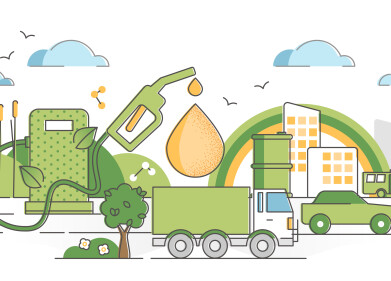Biofuel industry news
Carbon Footprint of Biofuels in Question
Mar 22 2011
African biofuels destined for Europe will result in up to six times the carbon emissions of fossil fuels, a new study has revealed.
The report, commissioned by the RSPB (UK), ActionAid and Nature Kenya, focuses on the Dakatcha Woodlands in Kenya which are set to be destroyed to make way for jatropha plantations.
Campaigners say the results of the study make a mockery of claims that biofuels are a green, renewable alternative to fossil fuels. Biofuel currently makes up around 3.5 per cent of the petrol and diesel in UK fuel pumps. However, the UK Government wants to increase this to meet EU targets.
The Dakatcha Woodlands is one of the last remaining coastal forests in Kenya and is home to thousands of indigenous tribespeople who will be made homeless if the plans go ahead, as well as a range of threatened wildlife.
Dr Helen Byron, RSPB’s Kenya expert, said: “The Dakatcha Woodlands are a haven for wildlife and the threat they face is a direct result of European demand for biofuels. No government has done a proper assessment of biofuels imported from overseas to see if they will, in fact, reduce our carbon emissions – so we decided to do it for them.
“We were shocked to discover that the biofuel produced from the proposed plantations at Dakatcha will result in up to six times more carbon emissions than fossil fuels.”
Tim Rice, ActionAid’s biofuels expert, said: “Biofuels are far from the miracle climate cure they were thought to be. Like most other biofuels, jatropha could actually end up increasing carbon emissions.
“Crucially the Dakatcha case also shows how biofuel plantations can create huge social upheaval with whole communities losing their land, homes and jobs.”
Dr Byron continued: “The proposed plantation in Dakatcha is just one example of the disastrous but unseen impact of biofuels on the climate, nature and people – there are plenty more coming to light all the time.
“The UK Government recognises the problems that subsidising biofuels is causing across the world and last week announced that it intends to limit such subsidies. But ministers must go further, they must challenge the European targets for biofuels and instead adopt an ambitious programme to reduce emissions from cars through improving efficiency and a massive roll-out of electric vehicles.”
Taking into account the emissions produced throughout the production process, the study found that jatropha would emit between 2.5 and 6 times more greenhouse gases than fossil fuels.
Much of the biofuel produced in Dakatcha is destined for Europe because of new European Union targets. The Renewable Energy Directive (RED) requires 10 per cent of transport to be renewable by 2020 and most member states plan to meet this almost entirely through biofuels – which is likely to result in a doubling of biofuel use in Europe by 2020.
The Dakatcha Woodlands is home to over 20,000 people and is the ancestral land of the indigenous minority Watha and Giriama tribes. The plantation will not only evict the tribes from their land, but will destroy their livelihoods and sacred burial sites.
The area is also a global biodiversity hotspot and home to a number of globally threatened animal and bird species including the spectacular Fischer’s turaco, southern banded snake eagle, Sokoke scops owl, and the Sokoke pipit. The Clarke’s weaver bird is found in only two places on earth and is threatened with extinction if the plantation goes ahead.
Digital Edition
PIN 25.6 Buyers' Guide
January 2025
Buyers' Guide Directory - Product Listings by Category - Suppliers Listings (A-Z) Articles Analytical Instrumentation - ASTM D7042: The Quantum Leap in Viscosity Testing Technology -...
View all digital editions
Events
Jan 20 2025 San Diego, CA, USA
Jan 22 2025 Tokyo, Japan
Jan 25 2025 San Diego, CA, USA
SPE Hydraulic Fracturing Technology Conference and Exhibition
Feb 04 2025 The Woodlands, TX, USA
Feb 05 2025 Guangzhou, China



















